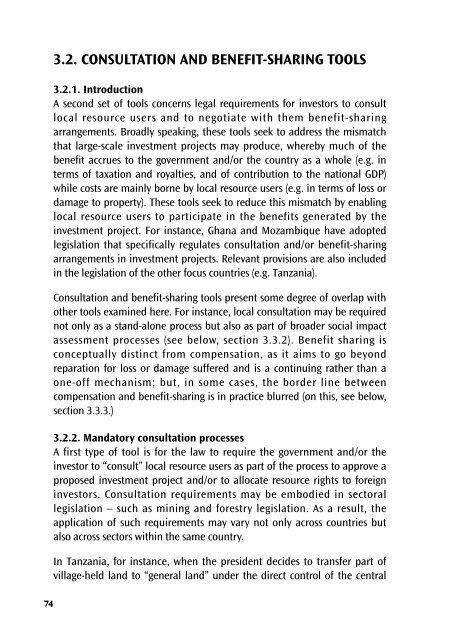Legal empowerment for local resource control
Legal empowerment for local resource control
Legal empowerment for local resource control
Create successful ePaper yourself
Turn your PDF publications into a flip-book with our unique Google optimized e-Paper software.
74<br />
3.2. CONSULTATION AND BENEFIT-SHARING TOOLS<br />
3.2.1. Introduction<br />
A second set of tools concerns legal requirements <strong>for</strong> investors to consult<br />
<strong>local</strong> <strong>resource</strong> users and to negotiate with them benefit-sharing<br />
arrangements. Broadly speaking, these tools seek to address the mismatch<br />
that large-scale investment projects may produce, whereby much of the<br />
benefit accrues to the government and/or the country as a whole (e.g. in<br />
terms of taxation and royalties, and of contribution to the national GDP)<br />
while costs are mainly borne by <strong>local</strong> <strong>resource</strong> users (e.g. in terms of loss or<br />
damage to property). These tools seek to reduce this mismatch by enabling<br />
<strong>local</strong> <strong>resource</strong> users to participate in the benefits generated by the<br />
investment project. For instance, Ghana and Mozambique have adopted<br />
legislation that specifically regulates consultation and/or benefit-sharing<br />
arrangements in investment projects. Relevant provisions are also included<br />
in the legislation of the other focus countries (e.g. Tanzania).<br />
Consultation and benefit-sharing tools present some degree of overlap with<br />
other tools examined here. For instance, <strong>local</strong> consultation may be required<br />
not only as a stand-alone process but also as part of broader social impact<br />
assessment processes (see below, section 3.3.2). Benefit sharing is<br />
conceptually distinct from compensation, as it aims to go beyond<br />
reparation <strong>for</strong> loss or damage suffered and is a continuing rather than a<br />
one-off mechanism; but, in some cases, the border line between<br />
compensation and benefit-sharing is in practice blurred (on this, see below,<br />
section 3.3.3.)<br />
3.2.2. Mandatory consultation processes<br />
A first type of tool is <strong>for</strong> the law to require the government and/or the<br />
investor to “consult” <strong>local</strong> <strong>resource</strong> users as part of the process to approve a<br />
proposed investment project and/or to allocate <strong>resource</strong> rights to <strong>for</strong>eign<br />
investors. Consultation requirements may be embodied in sectoral<br />
legislation – such as mining and <strong>for</strong>estry legislation. As a result, the<br />
application of such requirements may vary not only across countries but<br />
also across sectors within the same country.<br />
In Tanzania, <strong>for</strong> instance, when the president decides to transfer part of<br />
village-held land to “general land” under the direct <strong>control</strong> of the central

















